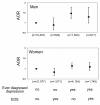Use of folic acid and vitamin supplementation among adults with depression and anxiety: a cross-sectional, population-based survey
- PMID: 21962075
- PMCID: PMC3200167
- DOI: 10.1186/1475-2891-10-102
Use of folic acid and vitamin supplementation among adults with depression and anxiety: a cross-sectional, population-based survey
Abstract
Background: Evidence suggests that folate deficiency may be causatively linked to depressive symptoms. However, little is known on the status of use of folic acid and vitamin supplements among people with mental disorders. This study examined the prevalence and the likelihood of use of folic acid or vitamin supplements among adults with depression and anxiety in comparison to those without these conditions.
Methods: Using data from 46, 119 participants (aged ≥ 18 years) in the 2006 Behavioral Risk Factor Surveillance System survey, we estimated the adjusted prevalence and odds ratios with 95% confidence intervals for taking folic acid and vitamin supplements among those with ever diagnosed depression (n = 8, 019), ever diagnosed anxiety (n = 5, 546) or elevated depressive symptoms (n = 3, 978, defined as having a depression severity score of ≥ 10 on the Patient Health Questionnaire-8 diagnostic algorithm).
Results: Overall, women were more likely than men to take folic acid supplements 1-4 times/day (50.2% versus 38.7%, P < 0.001) and vitamin supplements (62.5% versus 49.8%, P < 0.001). After multivariate adjustment, men with ever diagnosed depression or anxiety were 42% and 83%, respectively, more likely to take folic acid supplements < 1 time/day; 44% and 39%, respectively, more likely to take folic acid supplements 1-4 times/day; and 40% and 46%, respectively, more likely to take vitamin supplements compared to men without these conditions (P < 0.05 for all comparisons). Women with ever diagnosed depression were 13% more likely to take folic acid supplements 1-4 times/day and 15% more likely to take vitamin supplements than women without this condition (P < 0.05 for both comparisons). Use of folic acid and vitamin supplements did not differ significantly by elevated depressive symptoms in either sex.
Conclusion: The prevalence and the likelihood of taking folic acid and vitamin supplements varied substantially by a history of diagnosed depression among both men and women and by a history of diagnosed anxiety among men, but not by presence of elevated depressive symptoms in either sex.
Figures


References
-
- President's New Freedom Commission on Mental Health (US) Achieving the promise: transforming mental health care in America. Rockville (MD): Department of Health and Human Services, US; 2003.
MeSH terms
Substances
LinkOut - more resources
Full Text Sources
Medical

